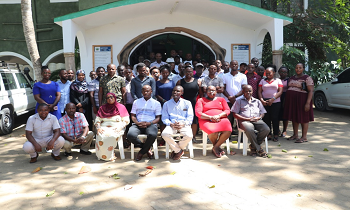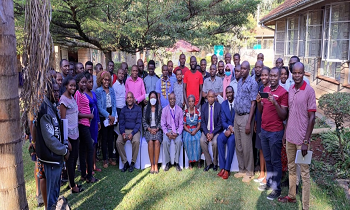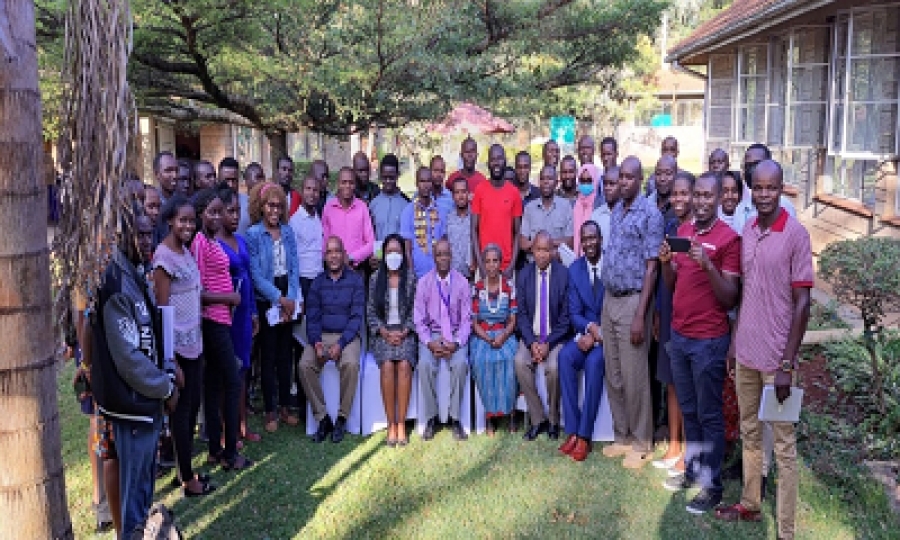Gender-Responsive STEM Education: Heads of Departments Training Course
By: Mr. John Makanda, Ben Mwangi and Winfred Magu
In April, CEMASTEA, in partnership with Education Development Trust (EDT), the Teachers Service Commission (TSC) and the Ministry of Education (MOE), organised a four-day training on Quality Gender-Responsive Science, Technology, Engineering, and Mathematics (STEM) Education. Participants for the training included Heads of Department, Quality Assurance and Standards Officers (QASOs) and Curriculum Support Officers (CSOs) from Kilifi, Kwale, Marsabit, Mombasa, Nairobi, Samburu, Tana River and Turkana Counties. The training took place from 4th - 7th April 2022 in Christian Organizations Research and Advisory Trust of Africa (CORAT Africa), Africa, Nairobi and Diani Forest Lodge in Kwale. The training theme was ‘Towards developing a quality gender-responsive stem education through enhancing learner-centred teaching and learning practices. There were three thematic areas; STEM and Gender, STEM Pedagogy & Gender and Communities of practice.


Group photos of participants, EDT staff , CEMASTEA trainers and Chief Guests, Mr. Bernard Okaka (Mombasa, above) and Mrs. Jacinta Akatsa (Nairobi, below)
During the training, participants learnt concepts of Gender-responsive pedagogy through plenary discussions, group discussions, scenarios, video clip observations, and textbook analysis. Key messages included that; teachers should encourage equal participation and involvement of boys and girls while taking into account their specific interests, learning styles and needs. Factors (individual, school, family and community) promote or hinder girls' participation in STEM learning. That it takes time to be proficient in developing and implementing lessons that have compelling gender considerations and that; gender-responsive pedagogy is part of ensuring inclusive learning environments where all learners feel respected and valued. Using models who have excelled in the field of STEM can encourage positive motivation and participation of girls in STEM. Teaching and learning materials are fundamental to the pedagogical process and can promote inclusive learning or reinforce systems of oppression, discrimination and inequality. Some important areas for inclusive gender-responsive concerns include; lesson planning, teaching and learning materials, language use in the classroom, gender-responsive activities, teaching approaches, classroom set-up and learning infrastructure.
In Kwale, the Chief Guest for the opening ceremony, TSC-County Director Mr Elias Gitonga, was represented by Mr Bernard Okaka, County ICT Officer. He elaborated on STEM subjects' critical role in achieving Sustainable Development Goals (SDGs) and developing a nation’s socioeconomic status. Mr Okaka affirmed that teachers’ roles are not only limited to imparting knowledge but competencies and skills in STEM subjects. He challenged the participants to continually improve themselves through training that provides the opportunity to grow professionally. He applauded the Education Development Trust and CEMASTEA for organizing the training. He equally lauded the teacher for attending the activity during the holidays.
Chief Guest for the opening ceremony in Nairobi was Ms Violet Munyasi, Principal Quality Assurance and Standard Officer, RDE Office. She explained that the role of the teacher in society could not be underestimated and informed participants that they were in a privileged position to learn and equip themselves with modern skills in teaching and learning. She encouraged the participants to take the initiative and provide an enabling environment for learners, especially in STEM and Competency-based Curriculum (CBC), to achieve positive learner outcomes. She reiterated that teachers should be the core components of the training and mentorship of learners in their schools.
Director CEMASTEA Mrs Jacinta Akatsa was the Chief Guest during the closing ceremony for the training in Nairobi, where she attended in person and Mombasa, where Ms Mary Sichangi represented her. She encouraged participants to change the narrative and preconceived notions about gender in STEM and the need to treat learners equally and build their self-esteem and confidence. She reminded teachers that learners are naturally curious and should aim to utilise the learner-centred pedagogy to tap into this. She encouraged the HODs to partner with school principals to establish and sustain communities of practice through school-based lesson study and to embrace a positive STEM culture by creating an inviting school climate. She lauded Ed Dev Trust for partnering with CEMASTEA to train the teachers and for the support that the Teachers Service Commission (TSC) and Ministry of Education (MoE) had accorded during the training
Senior officers from EDT participating in the training included Ms Margret Kamau from Nairobi and Mr Kaima Ruiga, Coordinator, Coast Region. They were happy with the training outputs and promised to continue supporting teachers, learners, and schools with relevant STEM resources.
Latest from Esther Nyambura
- CEMASTEA Hosts Successful INSET Centre Principals’ Workshop
- CEMASTEA Conducts Successful Holistic Learning Training for Rwandan Teachers
- Empowering Quality Standards and Assurance Officers (QASOs) for Enhanced STEM Education
- Science and Mathematics Teachers Pilot Symposium: Innovative Classroom Practices
- CEMASTEA Strategic Plan 2023 – 2027: Key Highlights

